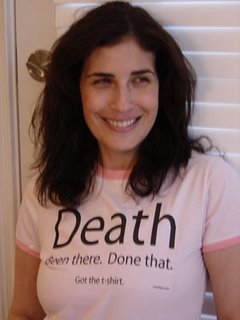The Mediterranean Diet, heart health and tips
After eating three different Christmas dinners, I am now stuffed and am dedicating myself to reading a new book Glenn got in the mail entitled, The Great American Heart Hoax: Lifesaving Advice Your Doctor Should Tell You About Heart Disease Prevention (But Probably Never Will). Although the book is about how to avoid heart surgery such as angioplasties and coronary bypass, the writer, Dr. Michael Ozner, is a cardiologist who also wrote The Miami Mediterranean Diet,
Although the book is about how to avoid heart surgery such as angioplasties and coronary bypass, the writer, Dr. Michael Ozner, is a cardiologist who also wrote The Miami Mediterranean Diet, so I decided to fast forward to the chapter, "Follow a Mediterranean Diet" to see if I could learn anything. Frankly, I don't think heart surgeries are a hoax, one saved my life and I am forever grateful to my doctors. I do think the author may be correct that those who are stable may not benefit from some of the tests and procedures, however. But that aside, the chapter on diet starts out with the author stating, "What you eat is the single most important factor in your health."
so I decided to fast forward to the chapter, "Follow a Mediterranean Diet" to see if I could learn anything. Frankly, I don't think heart surgeries are a hoax, one saved my life and I am forever grateful to my doctors. I do think the author may be correct that those who are stable may not benefit from some of the tests and procedures, however. But that aside, the chapter on diet starts out with the author stating, "What you eat is the single most important factor in your health."
I don't think I buy that, the single most important factor seems to be one's genes or other factors. However, I do agree with the author that eating is the one thing you can control and I think because of that, people tend to give it top billing to gain a sense of mastery over their fate. The advice given on the Mediterranean diet is nothing earth-shattering but there are good, straight forward tips on what to eat.
Dr. Ozner says to stay away from red meat, eating it at most weekly or monthly and lean cuts only. Avoid high fructose corn syrup as the average American consumes 73.5 pounds of this sweetener each year, a large increase since it was introduced in 1970. High fructose corn syrup increases triglyceride production which is a major risk for heart disease. He is not into milk and says if you must drink it, use fat-free or skim milk.
The main components of a Mediterranean diet are whole (non-refined) grains, fresh fruits and vegetables, nuts such as almonds and walnuts which have omega-3 fatty acids, olive oil, red wine, complex carbohydrates, omega-3 fatty acids, tea, fruit and vegetable juices, cinnamon (some research shows the smell improves brain activity), and finally, dark chocolate. Okay, nothing new here but it's good to hear again to refresh my memory.
The book seems good for those who wish to read up on how to prevent heart disease. Dr. Ozner has a ten-step program with information on how to take command of your blood pressure, reduce free radicals and oxidative stress, and how to avoid unnecessary diagnostic tests and procedures, among others. I will probably refer to it from time to time as I try to improve my overall health, especially now that the holiday eating frenzy is over and spring is around the corner (one can only hope).
I don't think I buy that, the single most important factor seems to be one's genes or other factors. However, I do agree with the author that eating is the one thing you can control and I think because of that, people tend to give it top billing to gain a sense of mastery over their fate. The advice given on the Mediterranean diet is nothing earth-shattering but there are good, straight forward tips on what to eat.
Dr. Ozner says to stay away from red meat, eating it at most weekly or monthly and lean cuts only. Avoid high fructose corn syrup as the average American consumes 73.5 pounds of this sweetener each year, a large increase since it was introduced in 1970. High fructose corn syrup increases triglyceride production which is a major risk for heart disease. He is not into milk and says if you must drink it, use fat-free or skim milk.
The main components of a Mediterranean diet are whole (non-refined) grains, fresh fruits and vegetables, nuts such as almonds and walnuts which have omega-3 fatty acids, olive oil, red wine, complex carbohydrates, omega-3 fatty acids, tea, fruit and vegetable juices, cinnamon (some research shows the smell improves brain activity), and finally, dark chocolate. Okay, nothing new here but it's good to hear again to refresh my memory.
The book seems good for those who wish to read up on how to prevent heart disease. Dr. Ozner has a ten-step program with information on how to take command of your blood pressure, reduce free radicals and oxidative stress, and how to avoid unnecessary diagnostic tests and procedures, among others. I will probably refer to it from time to time as I try to improve my overall health, especially now that the holiday eating frenzy is over and spring is around the corner (one can only hope).
Labels: heart health





